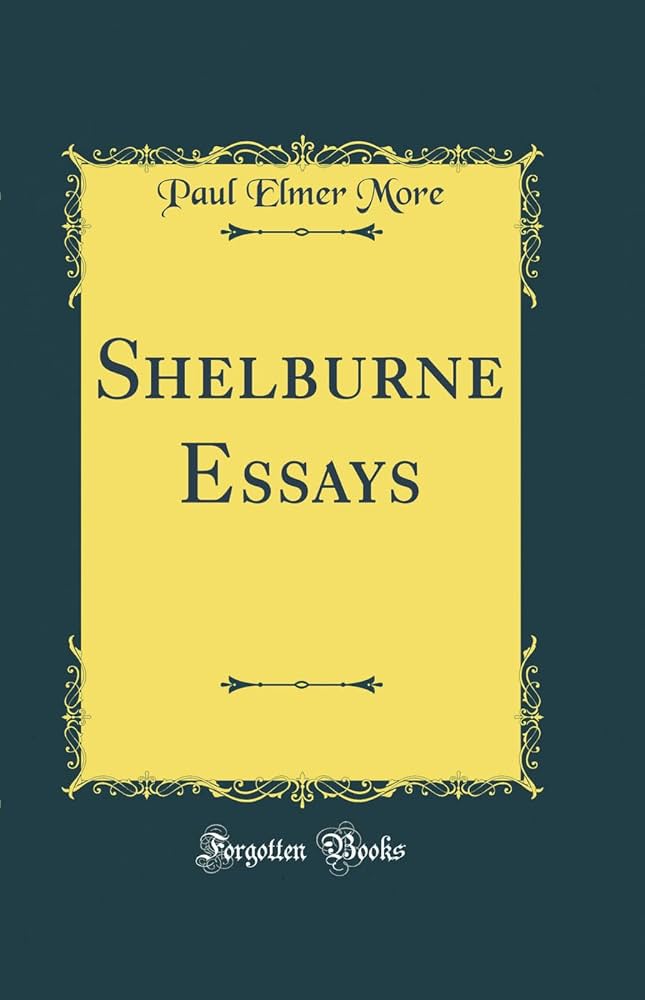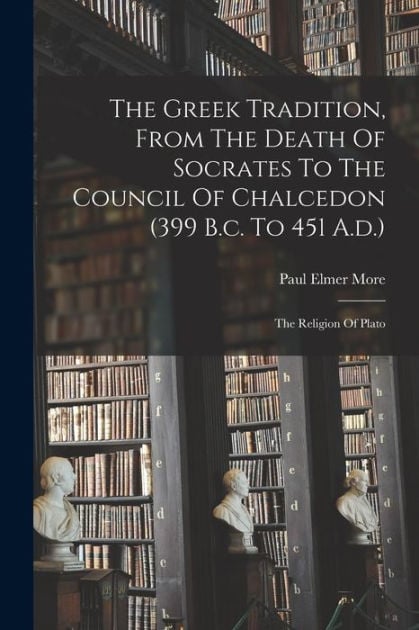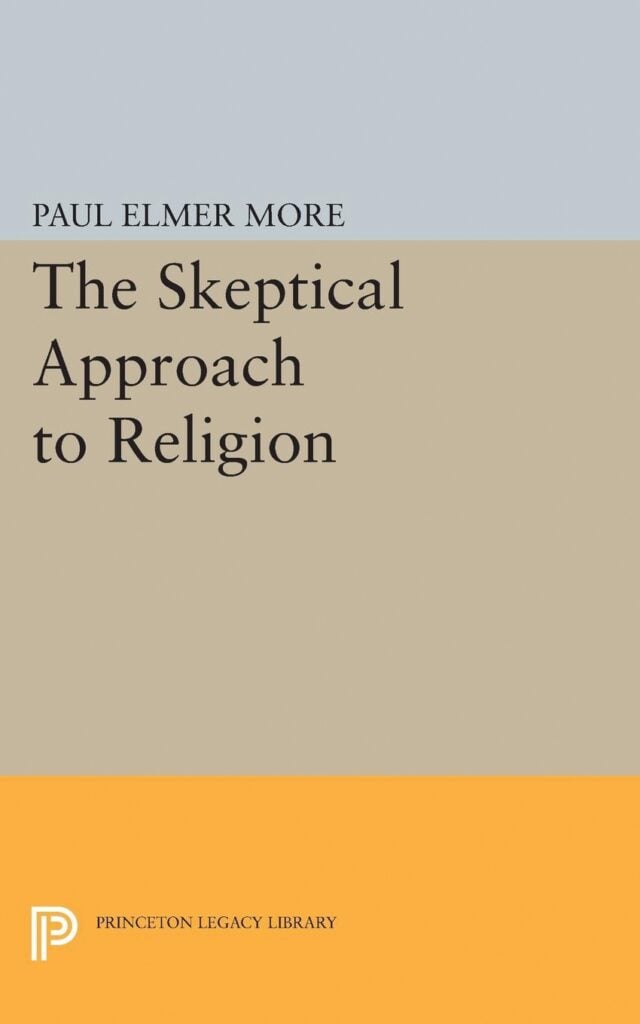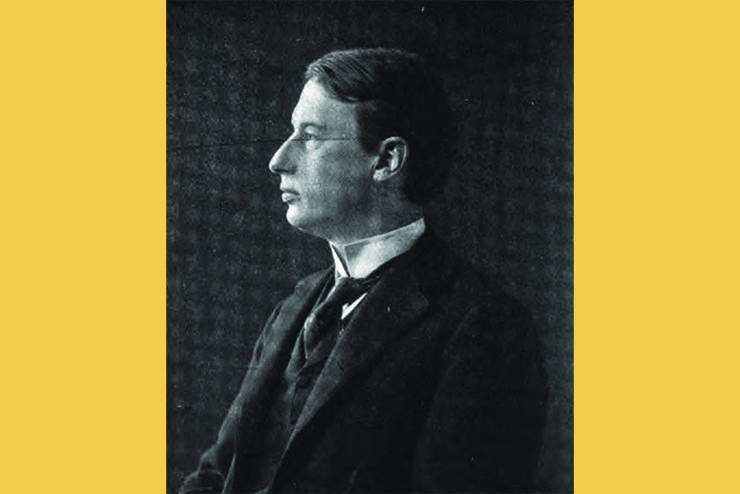The Skeptical Apologist
Paul Elmer More (1864-1937) was a literary critic, social thinker, historian of thought, and later in life an idiosyncratic Christian apologist. He was one of several notable independent-minded scholars, including Irving Babbitt, Richard Weaver, and the Southern Agrarians, who criticized America from a broadly traditionalist perspective during the first half of the 20th century.
His career was diverse. Born in St. Louis, he was educated at Washington University in that city, and after traveling and trying his hand at poetry ended up studying Sanskrit at Harvard. He briefly taught there and at Bryn Mawr, but soon left the academic world. After a couple of years in a cabin in Vermont, during which he read the Greek and Latin classics to fill what he had come to see as a gap in his education, he worked for 15 years as a literary editor, notably at The Nation.

More then retired from that profession and spent the remainder of his life writing essays and reviews, and lecturing and teaching graduate seminars, mostly at Princeton, and producing several books. His best-known works include the Shelburne Essays, published in 11 volumes from 1904 to 1921) and New Shelburne Essays, in three volumes from 1928 to 1936, which are collections of essays and reviews, and his four-volume work The Greek Tradition (1924–27), with its prologue Platonism (1917) and epilogue The Catholic Faith (1931), which provide an account of Greek religious thought from the death of Socrates to the Council of Chalcedon that focuses on the early roots and later development of fundamental Christian doctrine. Most of his works are freely available online in electronic form.

His view of the world changed repeatedly and drastically during his life. Each step, however, was a natural progression from the preceding one. Thus, he reacted against his early unbridled romanticism by becoming a strict materialist. He then accepted successively the reality of spirit, the coordinate reality of the material world, a Platonic appreciation of the Good, Beautiful, and True as principles that relate the two. Finally, after the age of 60, he converted to the Christian doctrine of the Incarnation as the way Platonism can become concrete and effective through the incarnation of the Logos.
Throughout, he was insistent on truth to experience, which he thought involved a seemingly irreducible duality between body and soul, in opposition to attempts to force all things into a perfect metaphysical order. His philosophical account of Christianity thus emphasized Platonic thought, with its concentration on dialogue, poetry, and myth, and its acceptance of its own incompleteness and of the duality of experience, and viewed Aristotelianism and scholasticism as rationalizing and absolutizing deviations that led, among other things, to an overly abstract and impersonal idea of God.
More is often associated with his friend and sometime colleague, Irving Babbitt (1865-1933), whom he met and who greatly influenced him while both were studying and teaching Sanskrit at Harvard. The two eventually became known as leaders of the New Humanism, an intellectual tendency favoring classical values of restraint, form, and moral seriousness in literature and higher education. That movement gained prominence during the 1920s and influenced figures like T. S. Eliot. It also roused opposition from other less classically minded intellectuals—notably H. L. Mencken, who nonetheless called More “our nearest
approach to a genuine scholar” and noted his disinclination toward movements and polemics.
More did join Babbitt in his dislike of indiscipline, direct democracy, sentimental socialism, the subordination of judgment to sympathy, and the demand for liberation of emotion and desire. Instead, they both emphasized the importance of personal responsibility and ethical striving, along with private property, and strong but limited government. The cure for the ills of democracy, More thought, was “not more democracy but better democracy” in which “people respect[ed] and follow[ed] their right leaders.” These would most often be found within a sort of natural aristocracy molded by good upbringing and a classical education that gave them intellectual balance and trained them in the lasting fundamentals of our civilization and the ability to think and express their thoughts clearly.
Also like Babbitt, he was an admirer of Edmund Burke, who nonetheless accepted the critical modern spirit. Both men thought that modern times required building an understanding of the world that is based on universal features of thought and experience rather than simple reliance on tradition and revelation. More’s acceptance of that approach in his Christian apologetics accounts for much of their idiosyncratic character.
With such concerns in mind, he emphasized the importance of what he (and later Babbitt) called the “inner check.” This was an aspiration we find in ourselves to something higher and better than our ordinary everyday self that makes moral reflection possible by enabling us to step back from impulse. He also emphasized imagination, considering it, along with distrust of human nature, a distinguishing feature of philosophical conservatism and a necessity for a stable and humane social order. He noted, for example, that the nation, as a continuing corporate and moral entity that links together various interests and classes, is a creature of the imagination.

An important difference from Babbitt was his eventual embrace of Christianity, which he came to see as socially basic and rationally compelling. His argument, exemplified in his 1934 book, The Skeptical Approach to Religion, was similar to Pascal’s argument in the Pensées: neither faith nor pure rationalism can be demonstrated to be true, but we live differently if we accept one or the other, so the brute necessity of living one way rather than another compels a decision.
The proper criterion for choosing our overall understanding of things, he thought, is then its ability to illuminate the world and make it possible to act rationally and consistently with our intuitions of what is right and true. But only if we view the world as the expression of a higher purpose can life itself have a goal, and we a reason for living well. Since we cannot help but view living well as somehow obligatory, we must choose a teleological view of the world in order to make sense of our own lives and thoughts.
Once faith in a purpose-ordered universe is accepted, More argued that one should choose the faith tradition that makes the most sense of the religious strivings of mankind. This faith succeeds in the sense that it eventually settles into a final form that sums up in a higher synthesis its historical development from primitive animism to monotheism. That tradition, More thought, is Christianity, which recognizes the sole way God could reveal Himself adequately is through His incarnation as man. Other religious traditions, after attaining to monotheism, had either frozen and rejected reason, or lost their way in eddies of pantheism, polytheism, and superstition—Islam and Buddhism provide examples. And More found that those who follow the way of faith in general and Christianity in particular find it life-sustaining. That verification in experience, he thought, justifies their conviction of the rightness of their choice.
More is still worth reading today for his learning, his moral seriousness, and the depth, breadth, perceptiveness, and independence of his thought. Although his literary standards were demanding, his judgments were nonpartisan and his literary tastes rather broad (apart from occasional limitations, such as his inability to see the point of T. S. Eliot’s poetry). His views on life, letters, and particular writers, including his comments on critical thought, imagination, and the inner check, remain valuable, and his Christian apologetics continue to be illuminating. More also led an admirably principled life, even in his decision to pursue an intellectual and scholarly career without a Ph.D. He was an early critic of academic credentialism and the cult of “research,” considering teaching and the conservation of knowledge the primary goals of universities.
Even so, and however useful he is for understanding a fundamental aspect of the conservative tradition, it is hard to see him as the primary guide for more than a few people today. An age of universal electronic communications is not a home for a moral elite of the sort he envisioned. It lends itself far more to sensation and celebrity than aristocracy and reverence. This is especially so since what passes for our educated moral and intellectual elite today is of dubious quality as such, and there no prospect of an educational reform that would improve it. An adequate response to current conditions would have to be made of stronger stuff—to choose one of his own comparisons: it would have to be more like Saint Paul than Cicero.
And in any case, More’s early philosophy of the “inner check” and so on hardly strike the imagination—a serious defect, given his emphasis on that aspect of human life—and are not things to which men are likely to give their lives. Nor can the “moral imagination” do much for us if we understand what it presents as imaginary or as the imaginative grasp of history and its lessons by a few intellectuals. More praises Burke’s reverence for ancient institutions and Plato’s religious myths, treating the latter as a way to tie spiritual experience together with plausible conjectures regarding ultimate realities into concrete images that appeal to our feelings and aesthetic perceptions. But divorced from divine revelation that underwrites their value and truth, how sustaining can political rituals or Platonic myths really be, especially in the face of serious opposition? All but a few conservatively inclined intellectuals will be inclined to ground their principles on a more concrete foundation.
For example, as citizens we are asked to sacrifice personal interests, sometimes life itself, for our country. That is the point of talking about “America” and “civic duties.” But the networks of natural and historical ties that have constituted America must be seen as part of something transcending them for such sacrifices to make sense. Can an imaginative construction serve that purpose when it is understood as such and debunkers are everywhere? A purely secular social order makes no sense, even when it is dressed up with mythological fictions. More himself notes a connection between the moral imagination and the Platonic “noble lie,” and most of us are inclined toward Flannery O’Connor’s view of the matter: “If it’s just a symbol, to hell with it.”
In the end, More came to share such concerns, and his eventual acceptance of Christianity as a way to bring something seen as real as well as noble into public understandings of the world is a crucial aspect of his thought. The similarity of his views to those of Pascal, a great theoretician of religion in the modern world of thought, suggests that they are suited in some basic ways to our times. And some people, such as Russell Kirk, have rated him very highly as an apologist to a skeptical age.
But Pascal’s thought has an existential urgency that More’s presentation of his own thought lacks, even though in fact its development was attended with what he calls “storms of emotion.” And he remained stubbornly skeptical even as he embraced belief—a tendency that lends all the more interest to the points he is driven to accept, notably an understanding of Jesus as both man and God and the Resurrection as somehow miraculous.
Even so, More’s bias toward keeping physical things physical and spiritual things spiritual leads him to take Paul’s vision of Christ on the road to Damascus—non-physical but nonetheless a true vision—as the model for all post-Resurrection encounters. He mentions the empty tomb, but is not inclined to make much of it.
But if God made the world, and the world includes obvious spiritual realities, such as our own consciousness, why expect a neat separation between Heaven and Earth? The point of the Incarnation is to overcome that separation, and ordinary people think it is good sense to look for something concrete and visible, like signs, wonders, and miraculously transformed lives, as evidence that their most important beliefs are more than imaginative constructions. Hence the prominence of such things in the Gospels and Christian tradition, and the popular failure of forms of Christianity that programmatically downplay them.
Reflection on inner experience is part of the religious life, and certainly that life requires some degree of skepticism: We should not believe everything we hear. But More’s insistence on paring religious commitments down to an irreducible minimum makes him unsuited for leadership, however useful he may be for intellectuals. His view of the Church as authoritative but not infallible, of her sacraments as effective but not by their inherent virtue, and of her creeds as definite but not to be taken altogether literally, aspired to Catholicism but never got there. As it was, it did not lead him to a personal commitment to any particular communion. Although he attended Episcopalian services, he was never confirmed, and he stubbornly persisted in his Platonic but un-Christian belief in a God who found the world fundamentally resistant to his efforts.
So More, for all his virtues and one-time prominence (he was sometimes mentioned as a possible recipient of the Nobel Prize for Literature), has over time exerted very little influence. Indeed, toward the end of his life he called himself “at once the least-read and most-hated author in existence,” and reflected that he would undoubtedly have been happier if he had moved permanently to England after giving up journalism.
America, to put it mildly, was not receptive to what More, considered the country’s most patrician critic, had to say, and sporadic efforts by conservative intellectuals such as Russell Kirk to revive him have uniformly failed. Our people generally are more interested in safety and comfort, and our elites in wealth and power, than in Platonic myths, the inner check, the moral imagination, skeptical arguments for religion, or idiosyncratic if often orthodox interpretations of Christian tradition. A solution to America’s social decline would evidently require a religious revival widespread and vigorous enough to support a reordering of society based on a substantive conception of the good life. After such an event, refinements of thought like those found in More’s writing might become relevant. But such a revival faces acute difficulties and depends on
developments that are unforeseeable and uncontrollable. As always, the spirit blows where it listeth—a problem of which More himself was very much aware.
But we have not reached the end of history. The scientistic and technocratic understandings that are now ingrained in our public life cannot support knowledge of the kind needed to deal intelligently with the world. So the more the present order develops the more we plunge into stupidity, incompetence, and disorder. That cannot continue forever. Beyond that, man is social, and society is based on things we cannot master because they make us what we are. Permanent features of human life require religious tradition, and it will outlast and eventually triumph over whatever disrupts and suppresses it. We cannot know when or how religion will return as authoritative, but return it will, and in the meantime our part is to live as well as we can and do what we can to promote better things. Writers like More, through their intelligence, perspicacity, and ability to connect us to broader and deeper traditions of thought, can help us do so. For that reason they must still be read.

Leave a Reply